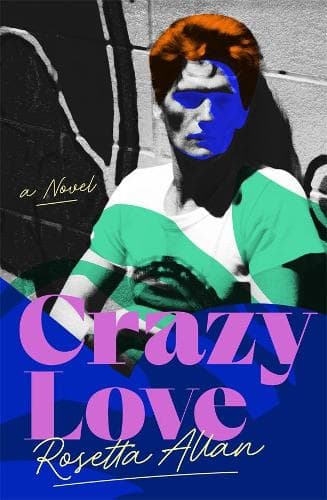Review: Crazy Love
Reviewed by David Hill
“Based on the author's own experiences,” says the blurb for Rosetta Allan's third novel. Isn't virtually every book of fiction? Even genres such as fantasy or crime embody the author's experiences of reading, imagination, life in general. A more significant criterion is how much a writer has succeeded in transmuting their life into literature.
So, I'll use a separate paragraph to affirm that Allan succeeds emphatically.
It IS a novel, right? I ask because parts of it read like a memoir or a piece of creative non-fiction. Hey, the blurb was right. And, as I muttered at the start, does it matter? Just occasionally, the profusion of detail – though this is a book where the spirit is very much in the specifics – does start to apply brakes to the momentum but mostly, the blend of forms builds into an engrossing, increasingly affecting narrative.
Three sections: BEFORE, DURING, AFTER, each comprising a lot of short, pulsing episodes, with a jolting little prelude from Auckland a decade back. The first block is longest; we're in the 1980s and Vicki has just left her spectacularly unsupportive Mum to live with “loser-boyfriend” (nice hyphen) in Napier's CBD mini-slums.
Aha! I also lived in Napier, though a geological era earlier, and I can vouch that Allan gets the setting spot on. Ahuriri woolstores; the Soundshell and colonnade; the copper-domed T&G building – a finance company; my parents called it “the Tickle and Giggle” – the “Three Ladies” on hilly Seaview Tce: it's all exact and authentic.
Vicki and L-B exist here in convincing squalor, amid a few drugs and thugs, a lot of inertia, an occasional fingertip chopped off to claim ACC. She's the most lively of the lot, looking for work, writing to Piggy (Rob) Muldoon and highlighting the plight of her generation. (He sends her a derisive $1 note in reply.) It's all raw, real and a tad repetitive.
Then she meets orange-haired graphic designer Billy, in his black stovepipe jeans spattered with paint, and at just the right time in the narrative, we start surging forward into different decades. They move to Auckland; get married, after stealing some restaurant flowers for the reception; live side by side, “alone and together, dependent and independent.” Life moves upwards for a while. “I want to be a writer,” Vicki tells Billy; “So do it,” he replies. But as she begins to bloom, his roller-coaster personality starts to derail.
And so to the final section, most retrospective of the three, where Vicki finds that people and buildings from her past have vanished or dwindled. She's determined to persist: “I like to win.” The story moves increasingly towards present tense, which is a deft way of easing the narrative into a reader's life. The couple toil together for academic success, negotiate business crises and their parenthood of surly daughter plus eat-and-run son. There's a whiff of counselling manual; there's also a terrific last line. You realise that Philip Larkin put it perfectly: “What will survive of us is love.”
Allan's writing crackles with energy. It's packed, pacy, smacks at your senses, edges towards a monotone just a few times. Vicki and Billy are as appealing a pair of bruised survivors as you'll meet and you may even spare a sympathetic nod for loser-boyfriend.
If I'm reading to review, I usually make notes as I go, faltering ballpoint in matching hand. With Crazy Love, I found myself hooked to the point where I was reading big chunks without scribbling a single note. I do hope Rosetta Allan heeds my grumping, and ... and keeps writing exactly as she has here.
Reviewed by David Hill
